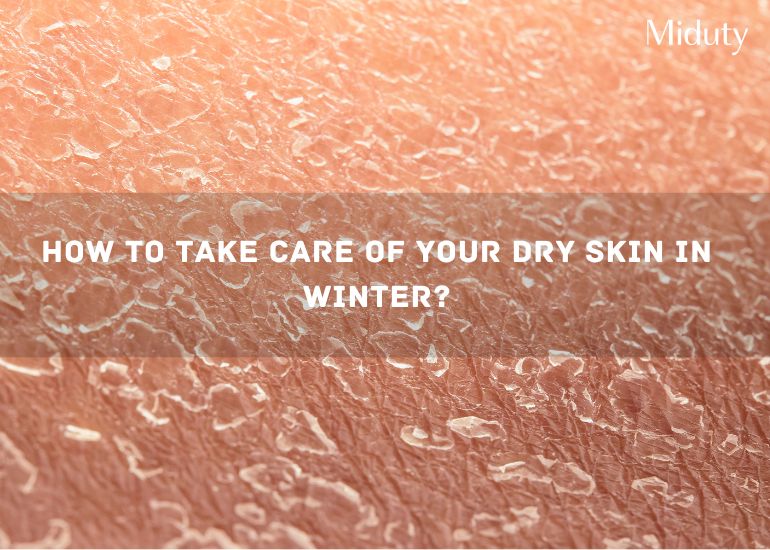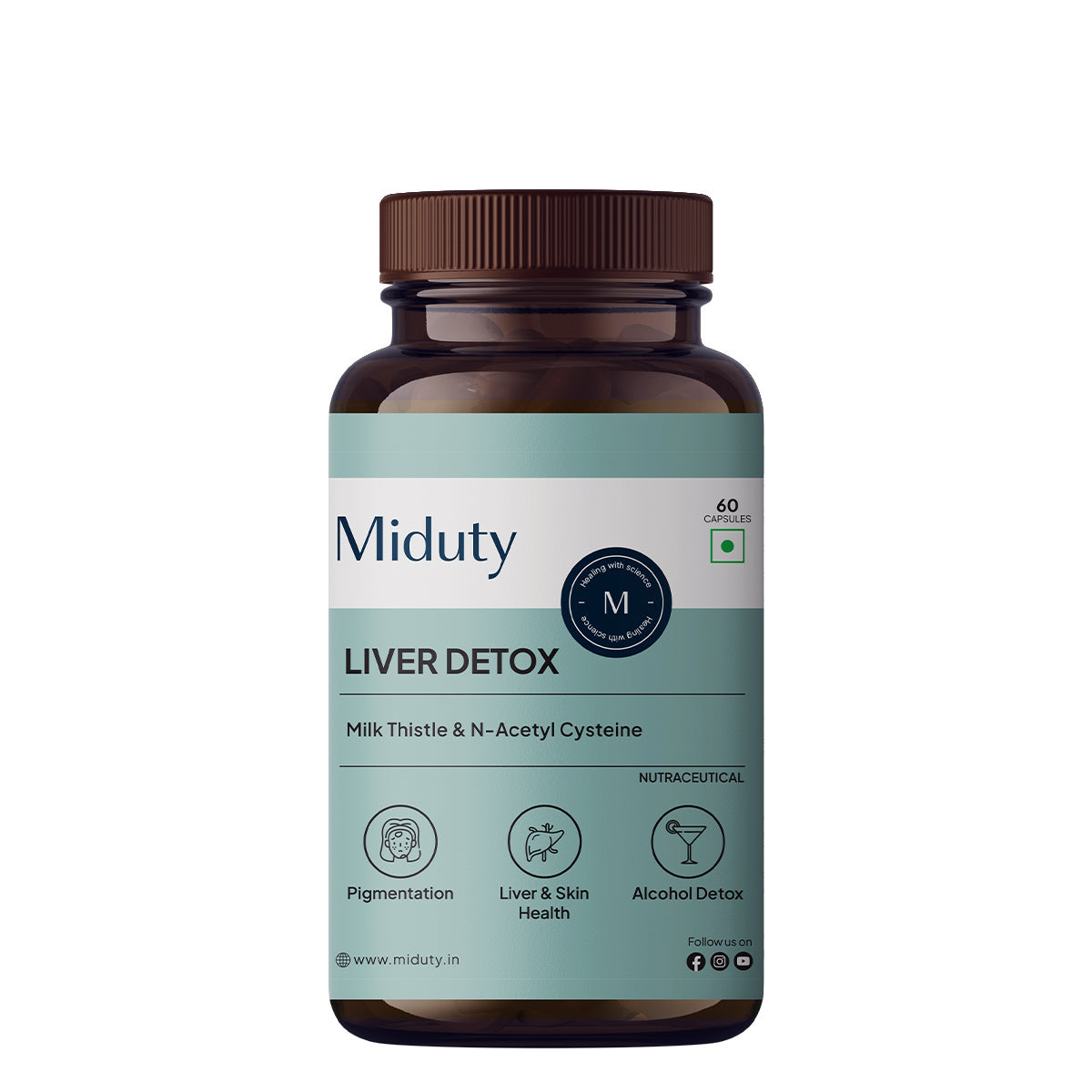
How to Take Care of Your Dry Skin in Winter?
 Share
Share
Although the outside weather may be harsh, your skin need not be!
Many experiences more than just pink cheeks when the winter months are chilly and clear. They also cause the skin on the hands, feet, and face to become uncomfortably dry.
Some people experience skin so dry that it peels, cracks, and in extreme cases develops eczema, which causes the skin to swell and feel tight. Are you also facing the same issues taking care of your skin during this winter? If yes!
Do not worry! As I keep on researching more and more about skin care each day, I am getting to know a lot of secrets to a healthy skin. And soon, you are also going to get the secrets as I am planning to launch my beauty brand soon - Miduty.
However, in the meantime I’ve got some tips which you can follow to get rid of your dry skin on your face and body in winter.
Dry skin is defined by the loss of moisture that leaves the skin feeling incredibly dry. It also leads to skin becoming so dry that sometimes it leads to bleeding.
If you have taken precautions, yet you are facing the issues of dry skin and want to know how to take care of your dry skin in winter, then continue reading this blog till the end.
What are the symptoms of Dry Skin?
While dry skin is a seasonal condition, it is possible for your skin to become excessively dry at any time of the year. This is a sign of a medical issue that requires care.
Some symptoms of dry skin are:
- Feeling your skin tighten, particularly after showering or bathing
- The skin is rough to the touch.
- Itching that continues
- Skin peeling
- Skin colour changes; it becomes grey
- Discoloration of the skin
- Deep cracks and bleeding cracks
What are the Causes of Dry Skin?
Dry skin is usually caused by environmental changes. It is more noticeable in the winter. There are a few medical issues that impact the skin's moisture content. The following are some of the most common reasons of dry skin:
- Climate: If you live in really cold climates, you are more likely to have skin dryness. During the winter, you may notice your skin getting dry and brittle, with frequent peeling. People who live in desert areas have dry skin all year since there is very little moisture in the air.
- Heat: In the winter, it is common for people in rural areas to gather around an open fire. To heat their rooms, the urban population uses artificial heating devices such as stoves, central heating systems, and fireplaces that burn wood or gas. The dry heat produced by these sources reduces the moisture in the atmosphere, resulting in skin dryness.
- Bathing in warm water: Bathing or showering in hot water on a daily basis can promote dry skin. [1]
- Products containing soap and detergent: Rubbing and scrubbing the skin with harsh products may reduce the moisture in
your skin, causing it to become dry. When using such products for a long period of time, the natural oil of the skin is drastically reduced. [2]
- Loss of Collagen: As we age, the production and the quality of the collagen starts to decrease in our bodies which leads to skin losing its elasticity and resulting in skin sagging and dryness.
Home Remedies to Get Rid of Dry Skin in Winter
- Use a Humidifier

During the winter, the air lacks moisture, causing the skin to feel stretched and dry out too rapidly.
A humidifier adds water vapour to the air, which helps the skin by avoiding dryness. [3] As a result, the device will assist you in maintaining that glowing and lively appearance even during the winter season. Install many little humidifiers in your home to help distribute moisture more evenly.
- Moisturise After Washing
When we wash your face, hands, or body, we remove the natural oils from our skin. It is critical to replace these oils since they help to seal in moisture. That is why, especially in the winter, it is critical to use a moisturiser after washing your skin.
As a reminder, have a bottle of moisturiser at your sink and a travel-size moisturiser with you when you're on the go.
- Vitamin C

Vitamin C is often said to be your skin's best friend. Consuming vitamin C-rich meals or utilising vitamin C-containing products helps improve the elasticity and natural glow of your skin. [4]
As much as your skin requires vitamin C all year, it requires a bit extra during the winter months to help you get rid of your stubborn pale winter skin and to give your skin the ability to get through the winter.
Starting your days with a glass of lemon juice and hot water not only provides your skin a healthy shine and promotes collagen, but it also detoxifies your body from within. You can also consume Amla in order to get adequate Vitamin C. Believe me, you will notice results in three weeks!
Additionally, to boost the collagen in your body you can take a Collagen Supplement.
- Omega 3 and Vitamin E

Anti-inflammatory and antioxidant qualities are rich in omega-3 fatty acids and vitamin E supplements.
Vitamin E can promote skin health by decreasing collagen breakdown and increasing hydration and elasticity, as well as acting as a natural anti-aging ingredient in your body. [5]
These nutrients can significantly minimise inflammation and oxidative stress in the body, which can also assist with skin dryness. You can also Increase your omega-3 intake and skin health by eating foods such as salmon, chia seeds, and walnuts.
I had testimonials from various clients who took Vitamin E and they said that their skin started to glow.
You can take Miduty Vitamin E supplement which is derived from organic plants such as Sea Buckthorn Berry, making it both vegetarian and natural.
- Fix Your Skin Care Routine
If your face's skin appears to be highly sensitive or inflamed as a result of the dry winter air, you may want to consider modifying your skin care routine for the time being.
Keep in mind that your skin's moisture walls must be healthy in order for skincare products, toners, and other forms of cosmetic treatments to work properly.
Furthermore, inflamed skin may be more sensitive to substances such as scent and alcohol. This means that things that normally feel fantastic on your face may become irritants for your skin.
It is essential to keep your skin care routine simple.
When the sky is cloudy and the temperatures are below freezing, applying sunscreen might be the last thing that comes to mind, yet it is critical for protecting our skin. Using sunscreen throughout the winter months helps to prevent sun-induced ageing and skin cancer. [6] During the winter, SPF 30 sunscreen is adequate. Apply moisturiser first, followed by sunscreen. Check the labels of moisturisers to see if they contain sunscreen.
Conclusion
It's fairly uncommon to have dry, flaky skin in the winter, which affects not only your face but also your hands, feet, and other exposed regions. The key to maintaining good skin is to moisturise it frequently. Using a humidifier and being hydrated might also help to protect your skin.
References
[1] https://www.ncbi.nlm.nih.gov/pmc/articles/PMC8778033/
[2] https://www.ncbi.nlm.nih.gov/pmc/articles/PMC3088928/
[3] https://www.ncbi.nlm.nih.gov/pmc/articles/PMC5588489/
[4] https://www.ncbi.nlm.nih.gov/pmc/articles/PMC5579659/
[5] https://www.ncbi.nlm.nih.gov/pmc/articles/PMC4976416/
[6] https://pubmed.ncbi.nlm.nih.gov/30803131/

